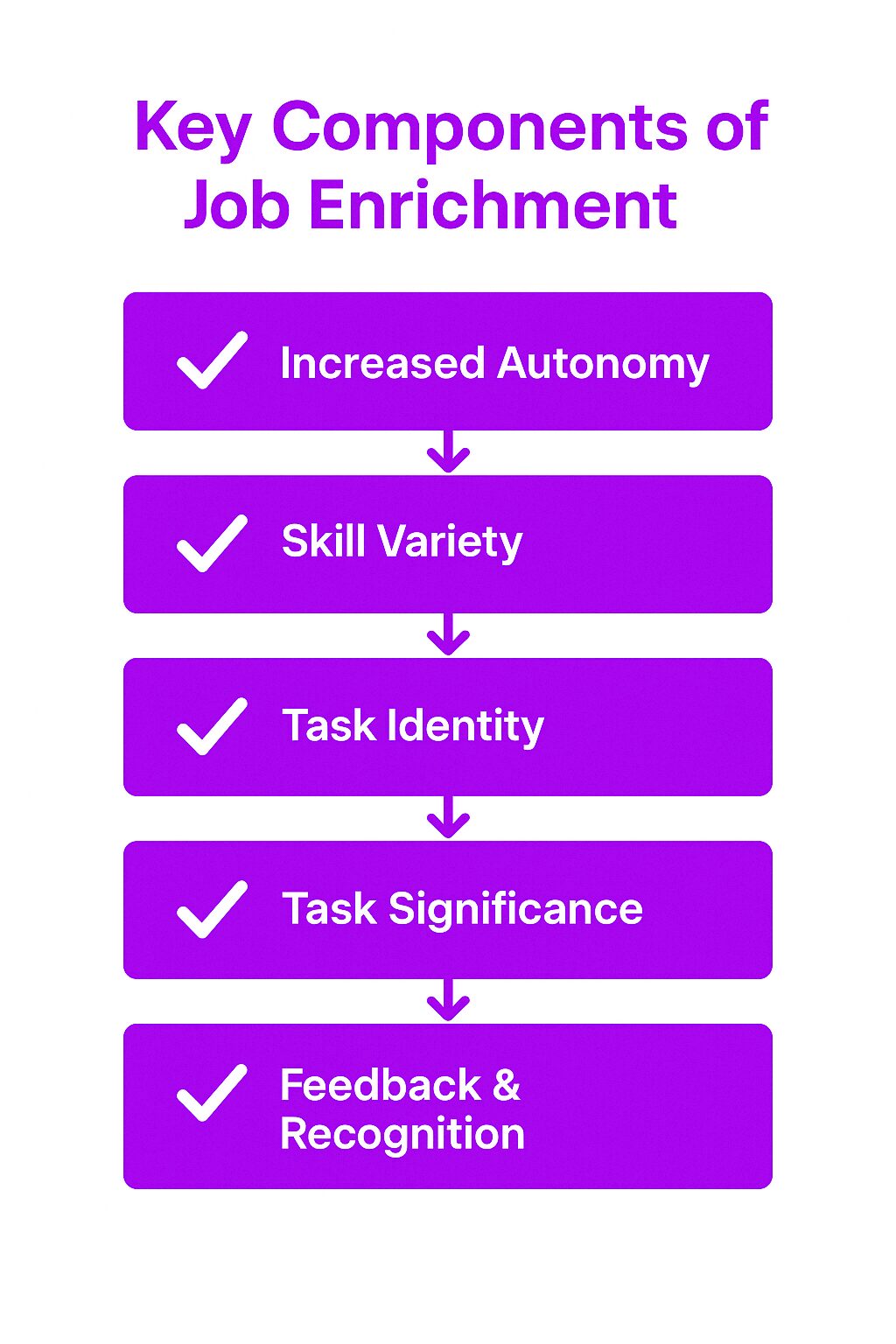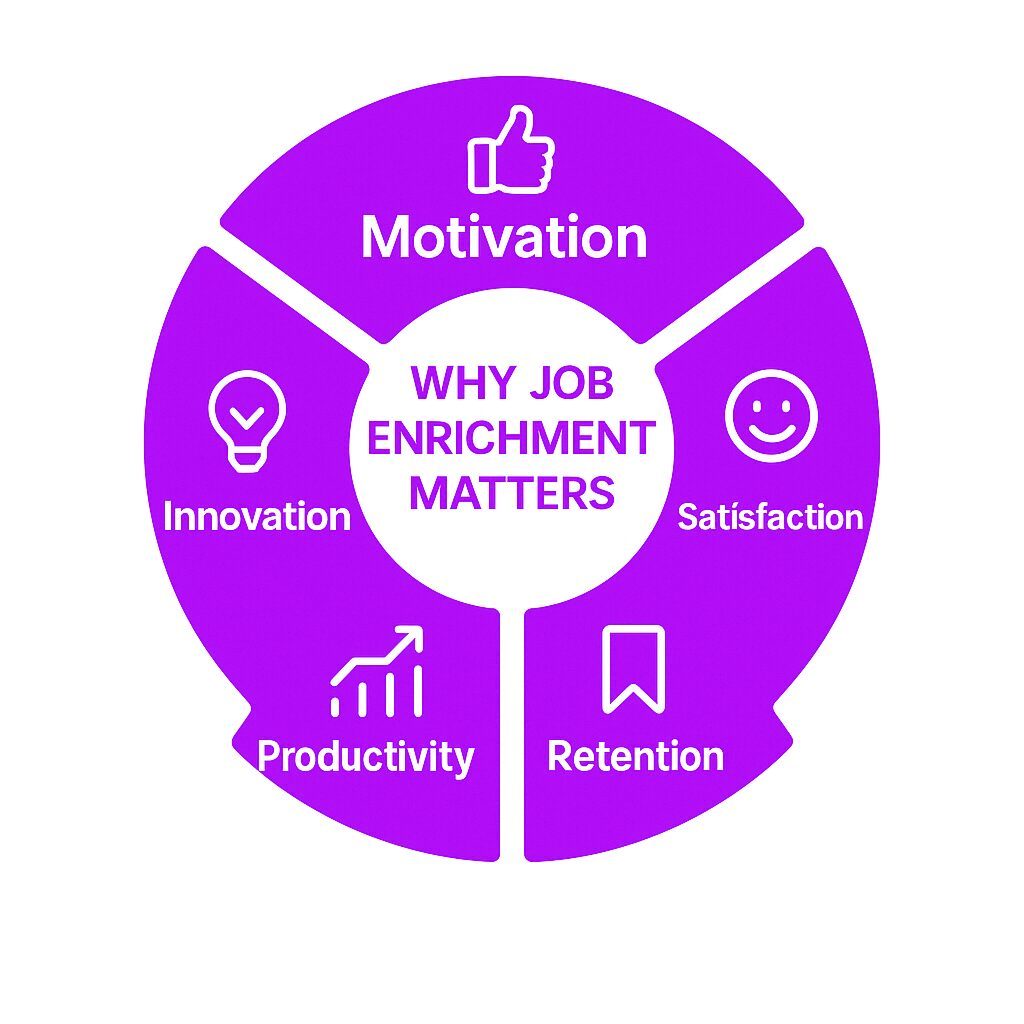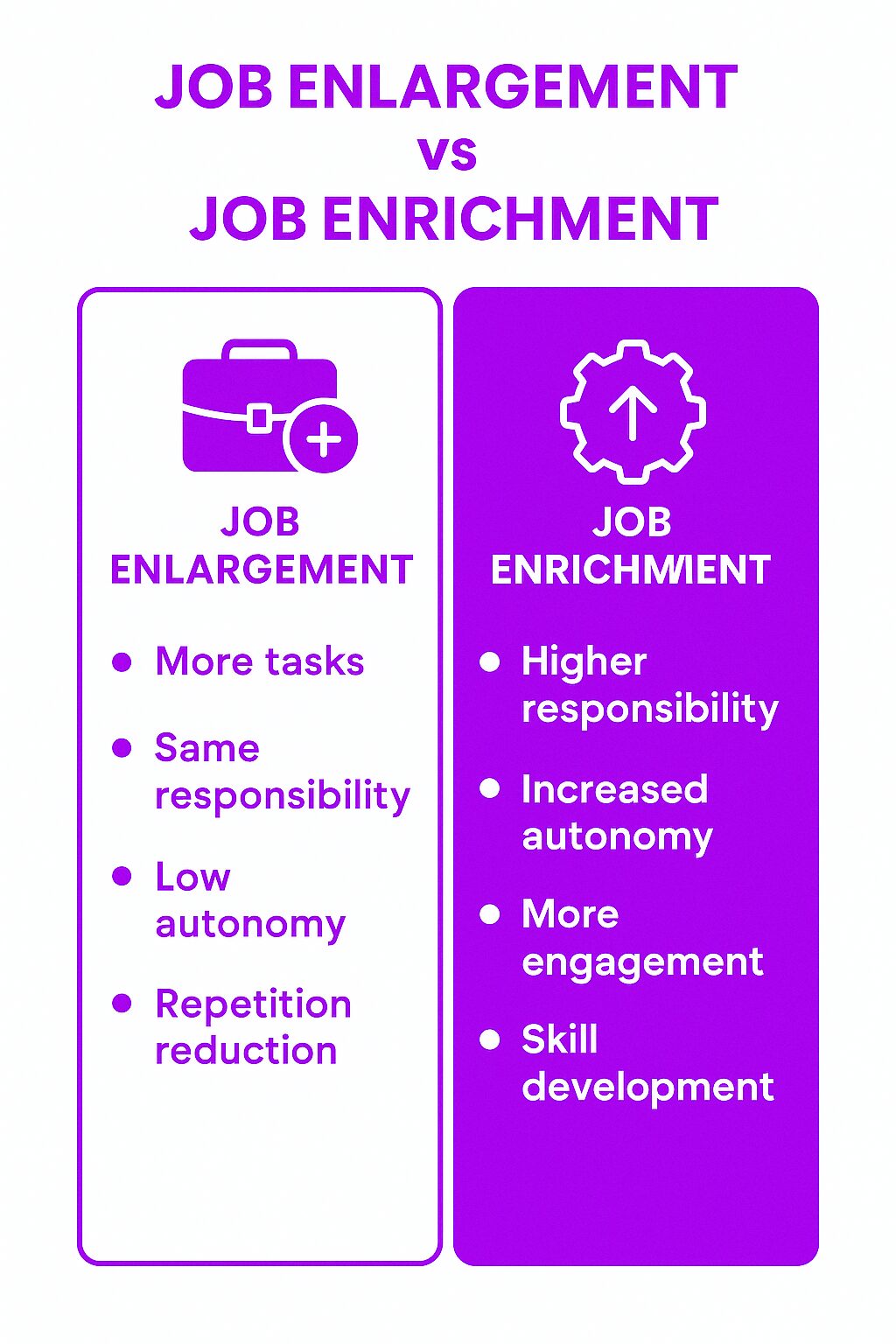What Is Job Enrichment?
Job enrichment is a strategy that enhances an employee’s role by increasing responsibility, autonomy, and task variety. The benefits of job enrichment include enhancing organizational culture and employee engagement by making work more meaningful through opportunities for skill development, decision-making, and personal growth.
Employee satisfaction is a crucial outcome of job enrichment strategies, as it can lead to improved motivation and overall organizational performance. Organizations use job enrichment to create more engaging work environments, helping employees feel more motivated and satisfied in their roles. When implemented effectively, job enrichment can lead to higher productivity, lower turnover, and improved job performance.
How Job Enrichment Works
Job enrichment involves restructuring a job to provide more meaningful and challenging tasks through the job enrichment process. Unlike job enlargement, which only increases the number of tasks without changing their nature, job enrichment gives employees more control over how they complete their work.
Job enrichment strategies can enhance employee engagement and satisfaction by creating more meaningful and fulfilling roles. Employees who experience job enrichment often take on additional responsibilities, gain access to professional development opportunities, and receive more direct feedback on their performance. These changes lead to a greater sense of ownership, making employees more invested in their work.
Key Components of Job Enrichment
Increased Autonomy
Employees are given greater control over their tasks, decision-making processes, and work schedules, which can enrich jobs and enhance employee satisfaction. When employees have more independence, they feel a stronger sense of accountability and engagement in their roles.
Skill Variety
Enriching jobs allows employees to develop a broader range of skills by engaging in diverse tasks, enhancing employee engagement and fulfillment. This prevents monotony and keeps work interesting while promoting professional growth.
Task Identity
Employees work on projects from start to finish rather than handling only one piece of a larger process. This gives them a greater sense of accomplishment and ownership over their work.
Task Significance
Employees understand how their work contributes to the organization’s goals, leading to increased motivation. When employees see the impact of their efforts, they are more likely to feel valued and engaged.
Feedback and Recognition
Providing employees with direct, constructive feedback helps them understand their strengths and areas for improvement. Recognition for achievements reinforces motivation and job satisfaction.
Why Job Enrichment Matters
Improves Employee Motivation
When employees feel that their work is meaningful, they are more likely to stay motivated. Job enrichment increases engagement by providing employees with challenging and fulfilling tasks, which can encourage employees and increase motivation.
Enhances Job Satisfaction
Employees who have opportunities to grow and develop their skills through job enrichment can significantly enhance employee satisfaction and productivity. When they feel valued and see a path for career advancement, they are less likely to seek new opportunities elsewhere.
Increases Productivity
Employees who are given autonomy and responsibility are often more efficient and productive. Job enrichment helps organizations maximize the potential of their workforce.
Reduces Employee Turnover
Job enrichment creates an engaging work environment that encourages employees to stay. High job satisfaction leads to lower turnover rates, reducing the costs associated with hiring and training new employees.
Encourages Innovation
When employees have the freedom to make decisions and solve problems, they are more likely to contribute innovative ideas that can benefit the organization.
Benefits and Challenges of Job Enrichment
Benefits
Higher Employee Engagement
Engaged employees are more committed to their work and contribute positively to company culture. Job enrichment fosters engagement by making work more meaningful.
Professional Growth Opportunities
Employees who take on enriched roles gain new skills, providing opportunities for personal and professional growth, preparing them for leadership positions and career advancement.
Stronger Collaboration
Job enrichment often involves cross-functional tasks, encouraging employees to work with colleagues from different departments. This improves teamwork and communication.
Challenges
Increased Workload
Giving employees more responsibility can lead to stress and burnout if not managed properly. Organizations need to balance job enrichment with workload distribution.
Resistance to Change
Not all employees want additional responsibilities. Some may prefer their current roles and resist job enrichment efforts.
Need for Training and Development
Employees may require training to handle new responsibilities effectively. Without proper support, job enrichment can lead to frustration and decreased performance.
Best Practices for Implementing Job Enrichment
Assess Employee Readiness
Not all employees will benefit from job enrichment. Organizations should evaluate employees’ interests, career goals, and skill levels before implementing changes.
Introduce Changes Gradually
Sudden increases in responsibility can overwhelm employees. A step-by-step approach allows employees to adjust to new roles and expectations over time.
Provide Training and Support
Employees need the right resources and guidance to succeed in enriched roles. Training programs, mentorship opportunities, and professional development courses help employees develop the skills they need.
Align Job Enrichment With Business Goals
Job enrichment should support organizational objectives. Aligning enriched roles with company goals ensures that employees contribute meaningfully to business success.
Offer Regular Feedback and Recognition
Employees need feedback to understand how they are performing in their new roles. Recognizing their contributions reinforces motivation and encourages continued engagement.
Related Concepts
Job Enlargement vs. Job Enrichment
Job Enlargement expands the number of tasks an employee performs without increasing autonomy or skill variety.
Job Enrichment enhances the quality of tasks by adding responsibilities, decision-making opportunities, and professional development. Job enrichment theory, rooted in Herzberg’s Two-Factor Theory, emphasizes how factors like skill variety, autonomy, and feedback can enhance job roles, leading to greater employee engagement and retention.
Job Rotation
Employees rotate between different roles to gain experience in various functions. This approach helps employees develop new skills and understand different aspects of the business.
Employee Empowerment
Job enrichment aligns with employee empowerment by giving workers more control over their tasks and decision-making processes.
Real-World Examples of Job Enrichment
Tech Industry
Software developers often participate in the entire product development lifecycle instead of focusing solely on coding. This allows them to contribute to design, testing, and deployment, increasing engagement and job satisfaction.
Healthcare Sector
Nurses who are given decision-making authority in patient care experience higher job satisfaction. Providing them with specialized training and leadership opportunities enriches their roles and improves patient outcomes.
Manufacturing
Assembly line workers who transition from repetitive tasks to quality control and process improvement responsibilities find their work more engaging. Job enrichment leads to higher efficiency and lower turnover rates in manufacturing settings.
Retail and Customer Service
Retail employees who take on inventory management, merchandising, and customer relations responsibilities develop valuable business skills and gain greater job satisfaction.
Final Thoughts
Job enrichment is a powerful strategy that enhances employee engagement, productivity, and job satisfaction. By increasing autonomy, skill variety, and responsibility, organizations create a more motivated workforce that drives business success. While challenges exist, thoughtful implementation and ongoing support ensure that job enrichment benefits both employees and employers.







